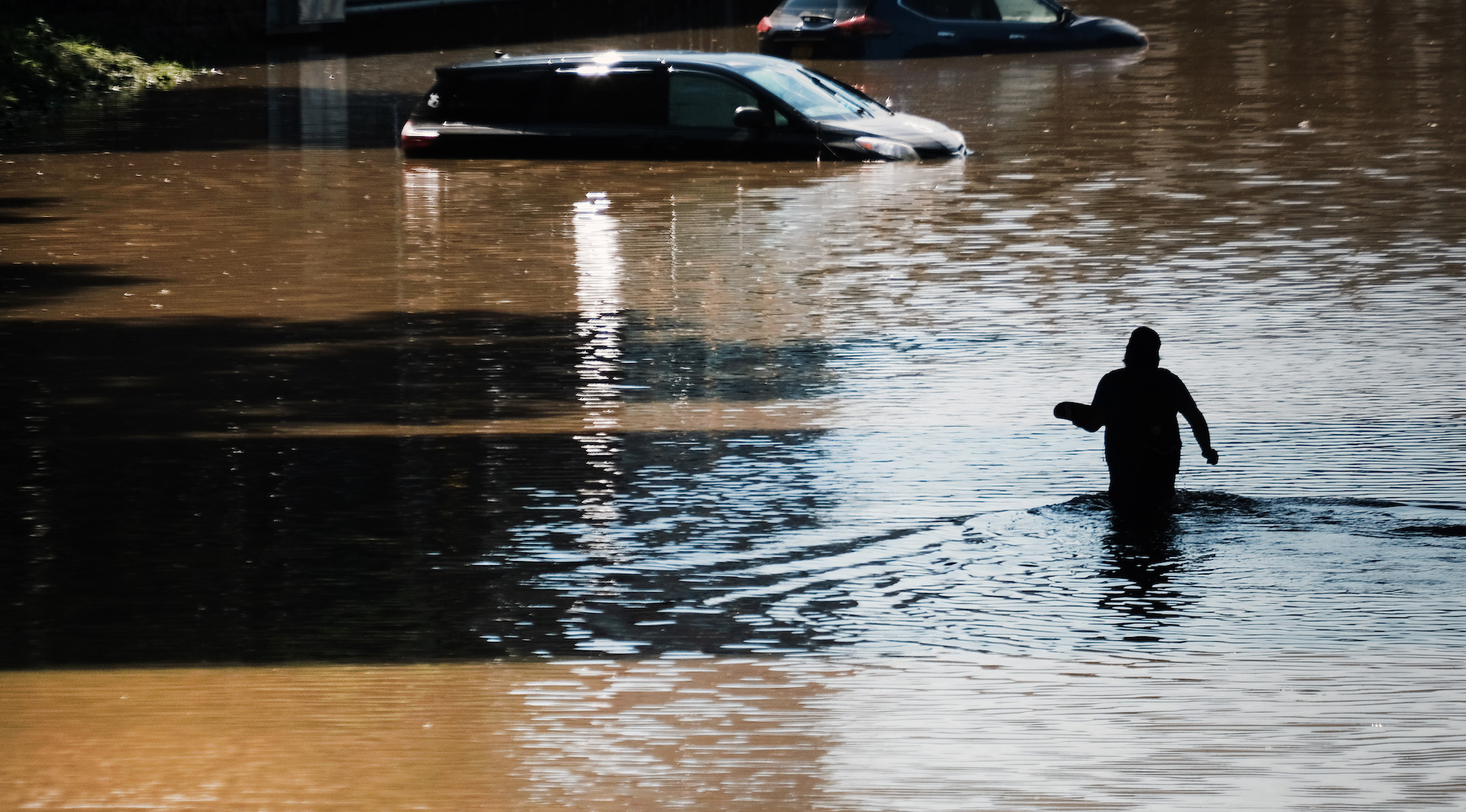“Who shall live and who shall die … who by water and who by fire … who by earthquake and who by plague …”
(JTA) — Twenty years ago, people cried when they said these words on Rosh Hashanah, six days after the attacks of Sept. 11. The ancient words suddenly held intense contemporary force.
Twenty years later we are being bombarded by climate-related disasters, one after another — each year worse than the last — and again our ancient machzor, the High Holidays prayerbook — carries fresh, urgent force for all of us.
Who by water? On the 16th anniversary of Hurricane Katrina’s horrific impact in New Orleans, another monster hurricane tested the rebuilt levees, cut off power and left catastrophic damage. Then the storm traveled up the East Coast causing widespread tornado-like conditions and massive floods, killing at least 24. All this just months after hundreds died in Germany due to unprecedented flooding.
Who by fire? Raging wildfires everywhere: in California, Oregon and Canada; in Greece, Italy, Turkey and Russia. Californians confronting dangerous air quality for months at a time, year after year. Eerie red-orange skies, smoke cascading across the continent, impacting cities as far away as the East Coast.
Who by plague? COVID reveals just how fragile we are — as individuals and as a society — and how it is always those most vulnerable who lose the most amid crisis.
Hundreds of thousands of American Jews enter these High Holidays having been deeply moved and inspired by Jewish environmental education, action and advocacy over the past 20 years and more. Our rising tide movement faces this historic inflection point in a deeply Jewish and universal posture. The IPCC Report, published just last month, makes clear that things are going to get worse before — if — they get better.
Confronting this crisis seems monumental — because it is. So much so that individuals might believe there is nothing they can do in the face of forces that have transformed life on the planet so quickly and negatively.
This crisis is so enormous, so global, so existential, many of us wonder how much our individual, institutional and/or communal actions can help turn the tide against such a tidal wave of climate disasters.
We hear you. And we cannot promise you what the future will bring. But we can promise you that by investing in a deep, universal cultural change across the Jewish world, we will be part of the solution — in the same way that victory gardens were part of the World War II effort 70 years ago and tzedakah boxes helped launch and defend Israel throughout the 20th century.
Of course we must fight for aggressive political and economic responses as well — both of which become more achievable as we build a passionate, committed Jewish climate movement that transcends ages, denominations and geographies.
During these Days of Awe, we must face this crisis while we face our own norah, our fear that it may be too late.
In the spirit of the holy days, with a commitment to repentance, prayer and justice, we ask you to join us in doing three key things, which together make up the Brit Hazon, a commitment to change:
Change your behavior. Drive less. Ride your bike more. Eat less meat. Use less energy at home, in your vehicle, in everything you do. Rosh Hashanah calls us to return to our best selves through teshuvah, repentance. It challenges us to own our mistakes and pushes us to do better in the year ahead.
Give. Time, money, advice, in-kind services and/or other support. So many inspiring leaders and powerful organizations are working around the world to respond to the climate crisis. When you consider giving tzedakah this season, please consider donating to Indigenous Climate Action, 350.org, Eden Village Camp, Jewish Climate Action Network (JCAN), Dayenu, Wilderness Torah, Urban Adamah, Shoresh or any other Jewish environmental or general climate organization on your radar. And yes, please support our work at Hazon as well. Give wherever you feel called, but please give. This is a global emergency of epic proportions. We need your support now more than ever.
Support systemic change. It is time for Jewish communities and institutions across the country — synagogues, day schools, camps, federations, JCCs, Hillels and countless others — to summon the will and leadership to join the hundreds of Jewish institutions that have blazed this trail for many years by prioritizing sustainability and caring for creation as a fundamental Jewish value. When institutional leaders commit to the Hazon Seal of Sustainability, we embark upon a multi-year journey together as partners, integrating Jewish environmental education, action, advocacy and adaptation into your community/organization.
In every age group, demographic and organizational structure — from b’nai mitzvah experiences to capital campaigns to interfaith partnerships and everything in between — we must rise up to confront this challenge with the full might of our institutions, our culture, our communities, and the power of Jewish wisdom, ethics and spirit.
This Rosh Hashanah also begins the shmita year, quite literally a supersized, yearlong Shabbat. Like Shabbat, it’s an end and a beginning, a time to look back over the last period and forward to the next.
So may this Rosh Hashanah inaugurate a year of Jewish communal reflection, facing the full threat of this crisis and our unique responsibility to take action for everyone alive today, and for our children, grandchildren and many generations to come — in America, in Israel and worldwide. These actions are inspired by a great love, a deep joy, hope and faith — and powerful communities that together will spark a Jewish cultural renaissance interconnected with a global transformation toward a brighter future for our people and all people everywhere.
The Jewish people have a long history. Our ancestors endured unspeakable suffering and calamity, then rose to meet the next challenge. In this moment we can do no less.
JTA has documented Jewish history in real-time for over a century. Keep our journalism strong by joining us in supporting independent, award-winning reporting.








